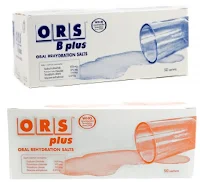Diarrhoea
Introduction
Opposite to constipation, diarrhoea refers to an increase in frequency of the passage of abnormally soft or watery stools relative to the usual bowel for that individual.
- It is usually a symptom of gastrointestinal infection, which can be caused by a variety of bacterial, viral and parasitic organisms.
Most patients will present to the community pharmacy with a self-diagnosis of acute diarrhoea (rapid onset, lasts <14 days).
Identifying the Need to Refer
Most cases of diarrhoea will be acute and self-limiting.
- The main priority in these scenarios is to identify patients that need immediate referral for further investigation.
- Dehydration is the main complicating factor, especially in the very young and very old.
Key trigger points of referral include:
- Duration longer than 2-3 days in children and older adults - at risk of dehydration?
- The presence of blood or mucus in the stools requires referral to eliminate invasive infections
- History of recurrent or chronic diarrhoea (>14 days) - Crohn's disease? IBS? Colon Cancer?
- Recent travel to South America or the Far East - Giardiasis?
NOTE: Many medicines can induce diarrhoea.
- Acarbose
- Antibiotics, particularly amoxycillin plus clavulanate or erythromycin or clindamycin
- Colchicine
- Laxatives
- Magnesium containing antacids
- Metformin
- Orlistat - leads to steatorrhea (fatty diarrhea)
- SSRIs
Management
Given that most causes of diarrhoea only last 24 to 48 hours, the main aim of treatment should be to
- Treat the underlying disorder and
- Correct dehydration electrolyte imbalance with fluid replacement.
The oral rehydration solution (ORS) formula recommended by the World Health Organization (WHO) contains glucose 74.9 mmol/L, sodium 74.1 mmol/L, potassium 20.1 mmol/L, chloride 64.6 mmol/L, and citrate 9.9 mmol/L in an almost isotonic fluid.
- Boiled and cooled water should be used to make the solution. Boiling water should not be used as it would cause the liberation of carbon dioxide.
- The solution can be kept for 24 hours if stored in a refrigerator.
- Home-made salt and sugar solutions should not be recommended to infants, young children and older patients since accuracy of electrolyte content is essential.
The use of antimotility agents should be reserved for situations where staying at home and resting would be impractical or inconvenient. The agents delay clearance of organisms, increasing the risk of systemic invasion, and can also induce local complications such as toxin megacolon.
- Loperamide
- CNS depressant effects and respiratory depression have been reported at high doses, doses are therefore limited to 16 mg/day and cannot be used in children under 12 years.
- Diphenoxylate with atropine
- As an adjunct to rehydration to treat diarrhoea in those aged 16 years and older.
- Atropine is added to diphenoxylate to discourage misuse (excess causes dry mouth, blurred vision, urinary retention), but in recommended doses, this has little pharmacological effect.
Other adjuncts to rehydration treatment:
- Diosmectite (Smecta)
- Safe and effective in reducing stool output and duration of diarrhoea.
- Not for children <2 years old.
- Racecadotril
- Reduces the secretion of water and electrolytes into the intestine.
- For adult and children over 3 months.
- Probiotics
- The effectiveness is very strain and dose specific.
Case: Traveller's Diarrhoea
Travellers' diarrhoea is a common travel-related illness and is primarily caused by ingestion of contaminated food or water.
- Patients present with a sudden onset of symptoms, including loose stools, abdominal cramps/pain, fever, vomiting or dysentery (bloody diarrhoea). These symptoms limit traveller activity.
- The pharmacist should also question the patient about food intake and also about whether other family members or friends are suffering from the same symptoms.
Management of traveller's diarrhoea depends on the severity of illness.
- Fluid replacement is an essential component of treatment for all cases of traveller's diarrhoea.
- Most cases are self-limited and resolve on their own within 3-5 days of treatment with fluid replacement only.
- Antimotility agents can provide symptomatic relief but should not be used when bloody diarrhoea is present.
- Antimicrobial therapy shortens the disease duration, but the benefit of antibiotics must be weighed against potential risks, including adverse effects and selection for resistant bacteria.
Summary
When travelling, advice should be given about drinking bottled water if quality of tap water is unknown and avoiding "street food".


Comments
Post a Comment